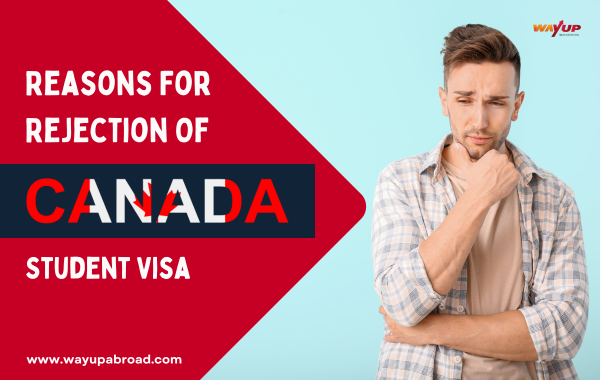Table of Content
Reasons For Rejection Of Canada Student Visa - Overview
Rejection Of Canada Student Visa is a common problem and there is nothing to worry about! For overseas students who have made every effort to get everything right, having their student visa denied can be extremely disappointing. You should be aware that Canada accepts a sizable number of students each year if you have decided to pursue your studies there. Rejection of a Canada student visa is a typical worry, though.
Rejecting a visa could be for a number of reasons. Although the immigration office's email may not have stated the grounds for the denial, you can access the information via the Global Case Management System, or GCMS.
This blog contains a list of typical reasons for visa rejections along with tips on how to apply or reapply without making the same mistakes. Let's check some common Reasons For Rejection Of Canada Student Visa:
7 Reasons for Canada Student Visa Rejection
There are several reasons why a Canada student visa (study permit) application might be rejected. Here are seven common reasons:
Incomplete Documentation: Failure to provide all required documents such as proof of acceptance, financial support, or medical exams.
Financial Insufficiency: Inability to demonstrate adequate financial resources to cover tuition fees, living expenses, and return transportation.
Lack of Genuine Intent: Suspicions that the applicant may not intend to leave Canada after completing their studies, which is necessary for a temporary visa.
Misrepresentation: Providing false information or documents, which can lead to a rejection and potentially a ban on future applications.
Ineligibility or Inadmissibility: Issues such as criminality, health concerns, or previous visa violations can make an applicant ineligible for a visa.
Language Proficiency: For programs taught in English or French, inability to demonstrate sufficient proficiency in the language.
Ties to Home Country: Inadequate proof of strong ties to the home country, such as family, employment, or property, which may suggest a lack of intent to return.
It's crucial to carefully review and fulfill all requirements and ensure all documentation is accurate and complete when applying for a Canada student visa to avoid the risk of rejection.
What is the Student Direct Stream in Canada?
You cannot enter Canada without a study permit; it is not the same as a visa. Study permit applications are processed more quickly when they go through the Student Direct Stream (SDS). It is intended for students wishing to apply to post-secondary designated learning institutions (DLIs) in Canada in order to study there. Legal citizens of a number of nations, including China, India, Pakistan, and Colombo, can apply for the SDS.
Tips For Applying For A Canadian Student Visa
Here are some tips for applying for a Canadian student visa (study permit):
Start Early: Begin the application process well in advance to allow time for gathering documents and completing requirements.
Check Eligibility: Ensure you meet all eligibility criteria, including acceptance into a Designated Learning Institution (DLI) and financial capacity.
Prepare Required Documents: Gather all necessary documents such as acceptance letter, passport, proof of financial support, and any other specific requirements for your application.
Financial Proof: Provide clear and sufficient evidence of funds to cover tuition fees, living expenses, and return transportation.
Complete Application Form Correctly: Fill out the application form accurately and completely. Double-check for any errors before submission.
Language Proficiency: If required, take and submit language proficiency tests (e.g., IELTS, TOEFL) scores as per the program's language requirements.
Letter of Explanation: Include a letter explaining your reasons for studying in Canada, your plans after graduation, and how you intend to return to your home country.
Medical Examination: If necessary, complete a medical examination and provide the required documentation.
Submit Application: Follow the submission instructions carefully, including any fees that need to be paid.
Track Application Status: Monitor the status of your application online and respond promptly to any requests for additional information from the visa office.
Prepare for Interview (if required): Be prepared for an interview with a visa officer if requested, and provide honest and clear answers.
Stay Informed: Keep updated with the latest requirements and changes in the visa application process.
By following these tips and being thorough in your preparation, you can increase your chances of a successful Canadian student visa application.
Conclusion
Studying in Canada gives students new chances and is quite rewarding. Nevertheless, obtaining your student visa accepted might occasionally be difficult. Getting assistance from study abroad advisors is the best approach to prevent having your Canadian student visa rejected. Students can receive assistance from WayUp Abroad in applying to and getting ready for admission to prestigious universities in Canada and various other nations. It is best to have a professional advisor assist with all the minute aspects, paperwork, and interview preparation when filing a Canadian visa application. So, get going and achieve your goals with the help of a group of knowledgeable study abroad consultants.
FAQ
Why was my Canada student visa application rejected?
Insufficient proof of acceptance, financial means, or ties to your home country.
What should I do if my financial documents were rejected?
Provide clear, verifiable evidence of adequate funds for tuition and living expenses.
Can a minor issue with my application lead to rejection?
Yes, even minor errors or missing documents can result in a visa refusal.
How important is language proficiency for the visa application?
It’s crucial. Meet the required English or French proficiency to ensure your application isn’t rejected.
Will my visa be denied if my sponsor’s financial stability is questioned?
Yes, ensure your sponsor’s financial standing is solid and well-documented to avoid issues.
What if I made a mistake on my application form?
Correct any mistakes promptly and provide accurate information to avoid complications.
Can a lack of clarity in my study plan lead to rejection?
Yes, clearly outline your study goals, program relevance, and post-graduation plans.
What happens if false information is discovered in my application?
Your application will likely be rejected, and you may face consequences for providing false information.
Will previous travel or visa rejections affect my application?
Yes, a history of visa refusals or irregular travel patterns can raise red flags.
How important are ties to my home country for the visa process?
Essential. Demonstrate strong ties like family, employment, or assets to show intent to return after studies.







Leave a Reply